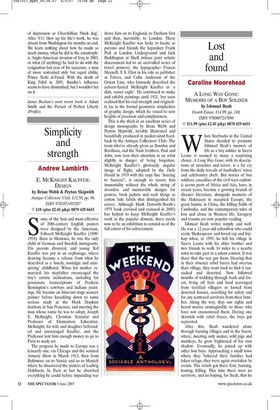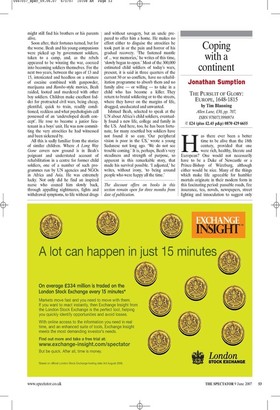Lost and found
Caroline Moorehead A LONG WAY GONE: MEMOIRS OF A BOY SOLDIER by Ishmael Beah Fourth Estate, £14.99, pp. 240, ISBN 9780007247080 © £11.99 (plus £2.45 p&p) 0870 429 6655 Ivhen Starbucks in the United States decided to promote Ishmael Beah's memoir of life as a boy soldier in Sierra Leone it seemed to many a surprising choice. A Long Way Gone, with its descriptions of atrocities and terror, is a far cry from the daily travails of footballers' wives and celebratory chefs. But stories of boy soldiers, casualties of the civil wars endemic across parts of Africa and Asia, have, in recent years, become a growing branch of disaster literature, alongside memoirs of the Holocaust in occupied Europe, the great famine in China, the killing fields of Cambodia, and the contemporary tales of loss and abuse in Western life. Savagery and trauma are now popular reading.
Ishmael Beah writes simply and well. He was a 12-year-old schoolboy who could recite Shakespeare and loved rap and hiphop when, in 1993, he left his village in Sierra Leone with his elder brother and two friends to walk 16 miles to a nearby town to take part in a talent contest. It was there that the war got them. Hearing that in their absence rebel forces had overrun their village, they went back to find it ransacked and deserted. Now followed months of trekking through bush and forest, living off fruit and food scavenged from terrified villagers or looted from deserted houses, searching for safety and for any scattered survivors from their families. Along the way, they saw sights and heard stories unimaginable to those who have not encountered them. During one skirmish with rebel forces, the boys got separated.
After this, Beah wandered alone through burning villages and in the forest, where, meeting only snakes, wild pigs and monkeys, he grew frightened of his own shadow. Eventually, he joined up with other lost boys. Approaching a small town where they believed their families had taken refuge, they were again overtaken by events. The rebels got there first, burning, looting, killing. This time there were no survivors, and no hoping, for Beah, that he might still find his brothers or his parents alive.
Soon after, their fortunes turned, but for the worse. Beah and his young companions were picked up by government soldiers, taken to a camp, and, as the rebels appeared to be winning the war, coerced into becoming soldiers themselves. For the next two years, between the ages of 13 and 15, intoxicated and heedless on a mixture of cocaine combined with gunpowder, marijuana and Rambo-style movies, Beah raided, looted and murdered with other boy soldiers. Children make excellent fodder for protracted civil wars, being cheap, plentiful, quick to train, readily conditioned, reckless and what psychologists call possessed of an 'undeveloped death concept'. He rose to become a junior lieutenant in a boys' unit. He was now committing the very atrocities he had witnessed and been sickened by.
All this is sadly familiar from the stories of similar children. Where A Long Way Gone covers new ground is in Beah's poignant and understated account of rehabilitation in a centre for former child soldiers, one of a number of such programmes run by UN agencies and NGOs in Africa and Asia. He was extremely lucky. Not only did he find an inspired nurse who coaxed him slowly back, through appalling nightmares, fights and withdrawal symptoms, to life without drugs and without savagery, but an uncle prepared to offer him a home. He makes no effort either to disguise the atrocities he took part in or the pain and horror of his gradual recovery. 'The fastened mantle of ... war memories,' he writes of this time, 'slowly began to open.' Most of the 300,000 estimated child soldiers of today's wars, present, it is said in three quarters of the current 50 or so conflicts, have no rehabilitation programme to absorb them and no family alive — or willing — to take in a child who has become a killer. They return to brutal soldiering or to the streets, where they hover on the margins of life, drugged, uneducated and unwanted.
Ishmael Beah, selected to speak at the UN about Africa's child soldiers, eventually found a new life, college and family in the US. And here, too, he has been fortunate, for many resettled boy soldiers have not found it so easy. 'Our peripheral vision is poor in the US,' wrote a young Sudanese not long ago. 'We do not see trouble coming.' It is, perhaps, Beah's very steadiness and strength of purpose, so apparent in this remarkable story, that made his survival possible. 'I adjusted,' he writes, without irony, 'to being around people who were happy all the time.'
The discount offers on books in this section remain open for three months from date of publication.





























































 Previous page
Previous page